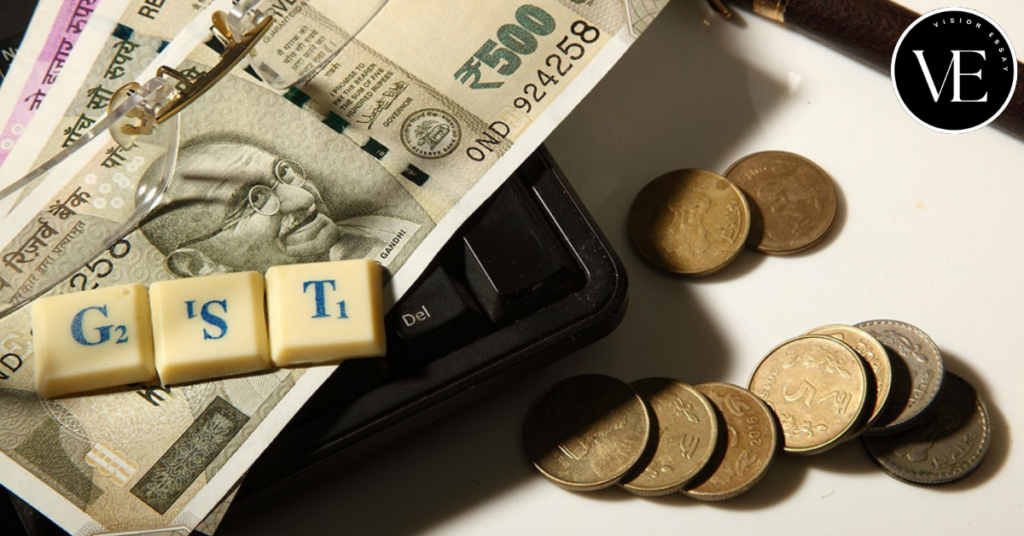Impact of GST On The Banking Sector
Introduction
India’s robust tax system, the Goods and Services Tax (GST), went into effect on 1 July 2017. All goods, including gold, tobacco products, and carbonated beverages, that were imported or exported into the nation were now subject to a new GST tax, which had a range of 0% to 28%.
Impact of GST on the Banking Sector
- Banks are required to seek distinct registrations for each branch they open nationwide under the GST. The primary reason for this is that, up until now, all banks have used a single, centralized registration approach, which is forcing banking personnel out of their comfort zones. The vast number of banks and their corresponding branches that exist in India directly relate to the complexity of this issue.
- The introduction of GST has made it more difficult to conduct free internal and external financial transactions between two different banks. We now have to pay a modest sum for this while making a financial transaction.
- We currently have two different kinds of taxes under the name of GST: the State GST, which is managed by the state, and the Central GST, which is overseen by the federal government. The banking industry’s complete set of procedures regarding the services they offer to clients is altered by these kinds of GST.
- Customers who maintain bank accounts are provided with a point-of-supply identity, which allows them to transfer funds to almost any place in India, regardless of the bank’s physical presence.
- The input tax credit was formerly prohibited under CENVAT regulations. However, this input tax credit is given to the banks with GST fully charged, which lowers tax avoidance during an external funding source.
- We now can guarantee seamless commercial operations in India and its surrounding nations thanks to the GST. A quick rise in the demand for money coincided with the business’s exponential expansion, which increased the volume of transactions that benefited the banks. This resulted in the baking industry’s overall benefit.
- A bank offers its clients a wide range of services, such as credit cards, debit cards, and online banking. The IT department requested that all systems, including ATMs and transaction systems, be upgraded in light of the new GST regulations about banking.
Challenges Faced by Banks
Banks have faced several difficulties as a result of the shift to the GST, which has forced them to efficiently adjust to the new tax structure.
- Technology Upgradation
- To guarantee compliance with the GST regulations, banks must modernize their IT systems. This entails guaranteeing smooth data interchange for tax reporting reasons and incorporating GST features into currently in-use banking platforms.
- Compliance Issues
- To adhere to the GST laws, banks must keep precise records of all of their transactions and tax payments. The possibility of fines and legal ramifications for any inconsistencies or non-compliance presents a serious obstacle for banks.
- Adjustments in Financial Systems
- Banks’ financial systems must be modified to account for the implementation of GST and changes in tax reporting and computations. To guarantee the correctness and dependability of financial data under the new tax system, extensive testing and validation are necessary.
Also read: Role of Digitization in Banking
Opportunities Arising
GST offers the banking industry the chance to improve operational effectiveness and pursue new revenue streams, despite some challenges.
- Streamlined Processes
- Banks can simplify and standardize their internal operations thanks to the Goods and Services Tax (GST). This may result in lower expenses and more efficiency in banking operations.
- Enhanced Transparency
- Since the GST was implemented, tax transactions are now more transparent, which limits the opportunity for fraud and tax avoidance. Customers, investors, and regulators are among the stakeholders who benefit from this increased trust and confidence.
- New Revenue Avenues
- Banks now have the chance to provide specialized services for tax advice, compliance, and reporting thanks to the GST. Banks may create more income streams in the GST ecosystem by utilizing their knowledge of financial management.
Conclusion
The fundamental operations of every company, including all Indian banks and the banking industry as a whole, have undergone a significant transformation. While we can continue to criticize the complexity that the GST has brought to banking offices and the resulting need for software system upgrades, we equally need to address the exponential growth of business and the amount of earnings that is going into Indian wallets. The implementation of this uniform tax has been a curse on the nation’s impoverished populace and a source of agony for its corporate titans.
Frequently Asked Questions(FAQs)
How does GST affect banking transactions?
GST has implications for the tax treatment of various banking services, influencing transaction costs and pricing strategies.
What challenges do banks face in adapting to the GST regime?
Banks face challenges such as technology upgradation, compliance issues, and adjustments in financial systems to accommodate the changes brought about by GST.
How can banks leverage GST to enhance revenue generation?
Banks can offer specialized services related to GST advisory, compliance, and reporting, tapping into new revenue streams in the GST ecosystem.
What is the future outlook for the banking sector under GST?
The banking sector is expected to continue adapting to the evolving GST landscape, leveraging technology and innovation to enhance efficiency and competitiveness.
Sources:
- https://economictimes.indiatimes.com/topic/gst-impact-on-banking
- https://www.kotak.com/en/stories-in-focus/taxes/impact-of-gst-on-your-monthly-budget.html
- https://www.icicibank.com/knowledge-base/tax/gst
- https://www.bankofbaroda.in/hi-in/banking-mantra/investment/articles/what-is-gst
- https://indianexpress.com/article/business/banking-and-finance/gst-impact-banking-services-insurance-premium-credit-card-bills-get-costlier-from-today-4730747/
- https://www.axisbank.com/progress-with-us-articles/gst-on-loan

Leave a Reply